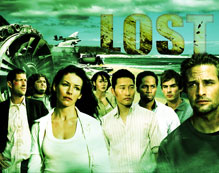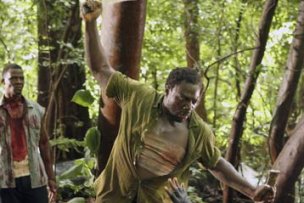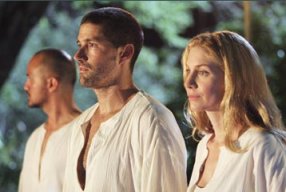Oh poor
Mr. Eko – the yin to Locke’s yang. As dirty
as that sounds, it is still inevitably true, and "The
Cost of Living" pretty much follows this line of thinking
to near completion.
Haunted
by his past and plagued by his decisions to do wrong for
the “greater good,” Mr. Eko finally awakens
after being visited by his dead brother Yemi. Similar to
Locke’s smokehouse vision of Boone, Eko sets off into
the jungle on a mission; however, his mission is far more
fatalistic than Locke’s act of retribution.
Instead
Eko gets the instruction to meet Yemi in the jungle “to
be judged.” Not very promising. While an injured Eko
stumbles through the jungle, Desmond and Locke set out in
search of a working computer in the Pearl Station.
What
is most interesting about Eko’s journey to judgment
and his history of criminal behavior in order to exist is
the implications of duty and loyalty. Eko tells Yemi, “I
did what I had to do to survive” and explains that
he offers no apology for his actions, once again playing
into juxtaposition with Locke’s own past.
Eko
did what he had to do – wrong or right. He took risks
for those he loved, and he broke the law several times.
Underneath his drug lord exterior was a man with good intentions,
but he was unwilling to do what he was told if he felt it
would stray from his own personal agenda.
Locke,
on the other hand, has always been willing to fall into
line when called upon to do so. Locke has consistently given
of himself in order to please a “grand design”
even if he has no clue or inclination as to what that design
may be.
The
struggle of Locke and Eko, it would seem, would be blind
faith versus resolute devotion. Each one is similar to the
other, but their distinct differences set their worlds apart.
So,
if Locke and Eko were both present for the implosion of
the hatch, and Locke found a renewed purpose, or re-birth,
post-implosion, then what lies in store for dear Eko?
Death,
of course. When finally faced with Yemi, Eko offers no repentance
for his sins, and he pleads with his brother to understand
his reasoning. The problem is, Yemi responds with, “I
am not your brother. Who do you think I am?”
Who
indeed? While Locke and Desmond explore the Pearl Station,
rewire the surveillance cameras, and ultimately find themselves
staring face to face with a one eyed man, Eko finds himself
face to face with the notorious smoke monster. Sure, he
may have stared it down once already, but his second standoff
is far less successful. This time the monster has a new
agenda, and we get glimpse of what damage this monster is
capable of inflicting.
Tossing
Eko about like a rag doll was, perhaps, one of the most
insane moments in the series thus far. We’ve seen
the monster before, but it always seemed so omniscient,
not a symbol of potential destruction.
The
religious figures continue to surface. Does Eko’s
death make him the Holy Ghost? Desmond seems more and more
Christ-like by the day. Where does this leave Locke?
Meanwhile,
back in the cold hands of Benry Gale, Jack is faced with
an opportunity. Perform surgery on Benry. Save his life,
and Jack will be allowed to leave the island safely. In
one of the most profound moments in television, Juliet decides
to show a movie to Jack. It is supposed to be To Kill
a Mockingbird, but is actually a pre-recorded message
to Jack consisting of Juliet holding up messages on cue
cards.
She
has an offer of her own, and it involves allowing Benry
to die on the table. It would seem that there is a rift
amongst the Others, or it could just be another trap. Benry’s
plea comes down to faith, and he asks Jack if he believes
in god. Jack, of course, does not, but Benry does, explaining
that days after learning of his fatal tumor, “a spinal
surgeon fell from the sky.”
Is everything
planned?
Next
Episode: The Fall season concludes as Jack must
make a decision about operating on Benry, Kate and Sawyer
get a little steamy, and in true Lost fashion, the plot
thickens. See you then.








